How Do Sports Help Release Children From Poverty?
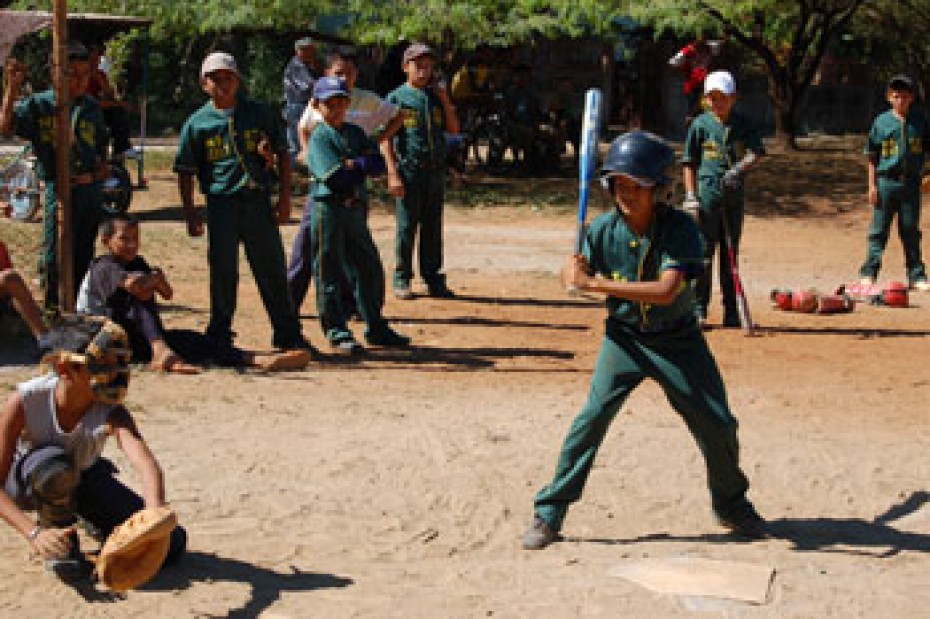
Four years ago, the Alfa y Omega Student Center opened its doors to the children of the community in San Benito, Nicaragua. And the work that initially looked hard is now obtaining great results.
Little more than a year ago, the idea of putting together sports teams at the center flourished. Three teams were formed: baseball, volleyball and soccer, and children volunteered to be part of one of them.
Continue Reading ›Living Off of Garbage
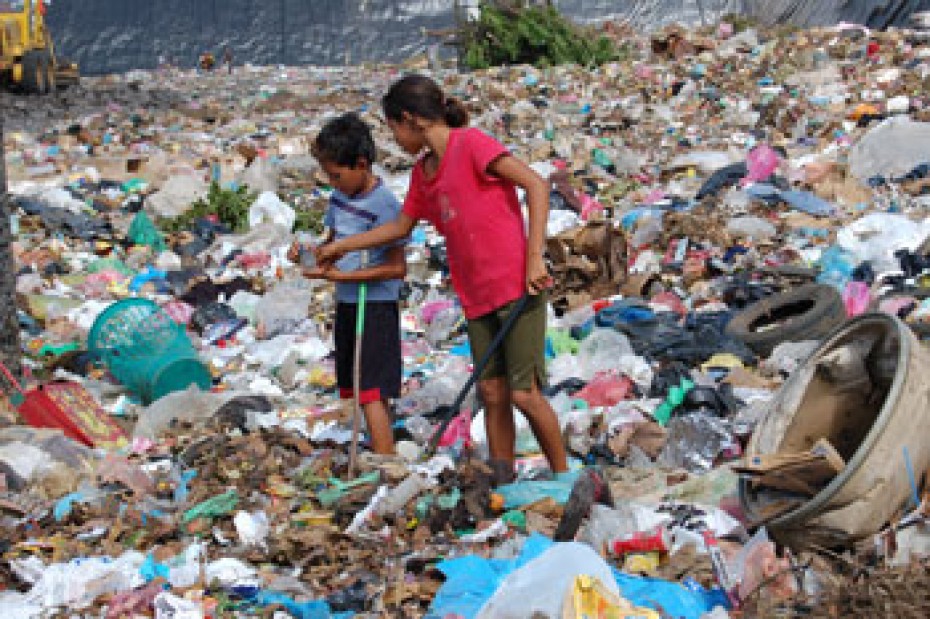
Garbage is everywhere. Two children and their mothers used to trudge over the piles, holding a hook to dig in garbage. They were here at the dump at 5 or 6 in the morning every day.
Nearly 150 children used to work at this dump in León, Nicaragua, looking for food and other necessities, helping their families’ financial situations by collecting recyclable material like plastic, glass and metal that could be sold later.
Juan Carlos and Fatima are two children from two different families who were part of that number.
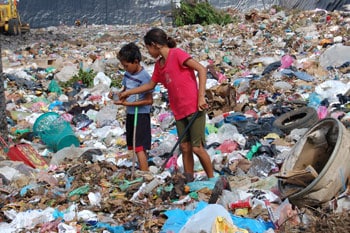
Almost every day Juan Carlos’ and Fatima’s mothers collected cans, copper and plastic bottles to sell at the end of each week. On a good week they’d get $5 to $10. The children went with them when there were no classes or activities at their child development center.
At the dump they were exposed to the hot Central American sun and an unsafe and unhealthy environment, punctuated with bad smells, flies, dirt and rotten food.
“I ask the Lord to take care of me because anything can happen at the dump. This year someone was killed in a fight for trash,” says Yolanda, Fatima’s mom. (more…)
Continue Reading ›The Importance of the Word of God for Children
Seven years ago, Nicaragua’s National Assembly made it official that the last Sunday of September would be dedicated to celebrating the translation of the Bible from Greek to Spanish.Throughout the national territory we celebrate. Sunday, Sept. 27, was the 440th anniversary.
In every department and/or town, churches from different denominations get together to celebrate.
Flowers, palm leaves and banners decorate trucks, and children dress in Bible costumes during the parade in celebration of the Day of the Bible.
Compassion Nicaragua understands the importance of the Word of God in the lives of children. That’s why in an effort to release children from their spiritual poverty, Bibles are given to every Compassion-registered child. The children receive Bibles that are appropriate for their age.
This year, 9,663 Bibles have been distributed. (more…)
Love Thy Neighbor (in Action)
A teacher of the law walks up to Jesus while He is teaching and asks Him, “Of all the commandments, which is the greatest?”
Jesus says to love the Lord your God with all your heart and with all your soul and with all your mind and with all your strength. The second greatest commandment is to love your neighbor as yourself.
The teacher of the law responds to Jesus, agreeing with what He has said, and then in understanding also states that these two commandments are “more important than all burnt offerings and sacrifices” (summary of Mark 12:28-34).
I have found that this act of love, to love our neighbor as our self, is no mystery. It is the living, breathing body of Christ working within the power and capacity of the Lord. Hurting when others are hurt, rejoicing when others rejoice.
We walk forward and love with love that has been poured on us, our hearts made sensitive to the needs of those around us.
We are intricately connected, I believe more so than we even suspect. We are one body, the Bride of Christ, each one of us examples of Christ’s love.
I expound upon this for a reason; I recently heard a story at Compassion in a meeting that left such awe resonating in my heart. So much so that I went and hunted down the pictures, the full report,* and then I requested to share it with you.
It is an account of the body of Christ in action, the call to love our neighbor being fulfilled.
Breathing was extremely difficult and oxygen had to be administrated 24 hours a day. His daily life had to be overseen 24/7 and the worries of the medics grew day after day as Stuart had to struggle with an illness called subglottic stenosis.
Subglottic stenosis causes the throat to narrow and makes the breathing process complicated, and for Stuart restricts his life to 50 percent of normal capabilities.
Stuart has suffered from this illness since he was 3 years old, and as the doctors in Nicaragua examined his case, they realized that the appropriate treatment could not be done there but rather only in Europe.
Dr. Erick Castillo (Compassion Guatemala’s Health Specialist), worked closely with Dr. Nubia Figueroa (Compassion Nicaragua’s Program Implementation Manager) sharing reports about Stuart’s health status, and found in Guatemala a medic who could fulfill this surgery and suggested this new option.
Reluctantly, Stuart’s mom agreed to travel to Guatemala, but later regretted her decision and turned down her permission to let Stuart travel. Her fear was that this surgery leaves a small open hole in the patient’s throat for at least one year, depending on the alimentation and care that he is given.
Eventually, though, Stuart was able to travel to Guatemala and had this laser surgery that resulted in a successful outcome for his life!
Ingrid González (Compassion Guatemala’s Curriculum Specialist) opened her home doors for Stuart and his mother while he was recovering from this surgery, and along with Erick Castillo, treated him the very best they could by praying, giving encouraging words and striving to help them feel at home as they were in an unknown country.
Compassion Guatemala, through its Country Director as well as the local office’s prayer group and many of its staff, constantly monitored Stuart’s case to see how he was doing. Stuart received many gifts from the staff and was even taken to church and then to an outing by one of the staff members on a beautiful Sunday.
Stuart continues to thrive in life, and his health is continually improving since his surgery.
Dr. Castillo and Dr. Figueroa continue to oversee Stuart’s health by sharing mutual reports, since Stuart must return soon to Guatemala for his respective medical follow-up to make sure everything is all right, especially the small hole left in his throat.
Compassion Guatemala continues to advise our partners in Nicaragua to give Stuart proper support, from his student center to his home.
Stuart’s birthday was June 9, the first birthday that he did not spend in a hospital. What a beautiful thing!
The command to love our neighbor as our self is a great task but one that can result in victories … even in saving lives.
And let us remember how Jesus responded to the man who acknowledged the beauty of the command:
“When Jesus saw that he had answered wisely, he said to him, ‘You are not far from the kingdom of God.’” – Mark 12:34 (NIV)
*Stuart’s story was written by Samuel Llanes in the Compassion Guatemala office.
10 Questions With Lilliam Sánchez
Lilliam Sánchez has been married to her husband, Francisco, for six years, and they are pregnant with their first child. She is the youngest of three sisters and one brother.
Lilliam was born in Ciudad Sandino, and she and her family have lived there for many years.
Lilliam is an active member of Betania Baptist Church. She has been at that church for nine years, serving as Sunday school teacher and church secretary. She’s worked for Compassion since 2003 and has been a Partnership Facilitator (PF) since October 2007.
1. What are the main responsibilities of your position?
As a facilitator, I help strengthen the church to reach results in the four areas of our work with children: spiritual, emotional, cognitive and physical.
For example, in the physical area, we want children to choose good health habits and to be healthy, so I try to see if that result is being reached or not, because we don’t want it just to be written in paper.
In the cognitive area, it is not about spending more money on a computer course for the children. It is about the child’s learning and how he or she is using the resources. And so on in each area.
The church partner also gives clear information of how the budget is being used, and facilitators help them in this administrative area.
I want to be clear and let you know that the results aren’t seen from one day to another. It is a process.
I believe my responsibility is to help churches become self-sustaining. I don’t want children to be sponsored the rest of their lives. I want a generation that can support themselves and sponsor other children.
I want churches spiritually and economically strong, to be light in the midst of darkness.
This also is a process. It might not be seen in one, two or five years, but we are putting the foundation down now to make them strong to reach maturity.
2. Describe what an average day is like for you.
I have two facets. One is the work I do at the office and the other, the work I do in the field.
The partnership facilitator’s role has changed and I spend most of the time in the field, supporting directly the partner churches.
Normally, I have one day at the office (Monday) to do the office work, like follow-up funding and reporting. I also coordinate monthly activities and evaluate activities of the previous month in the PF meeting, analyzing achievements and weakness to look for better alternatives.
The other four, five or six days (because sometimes I work Saturday and Sunday, if necessary), I am with the church partner. It is arduous work seeing how the children are doing, how the church is working, and looking for alternatives to do better work. Results aren’t be achieved if I stay at the office.
3. How many churches do you visit a day, and how often do you visit a church? (more…)
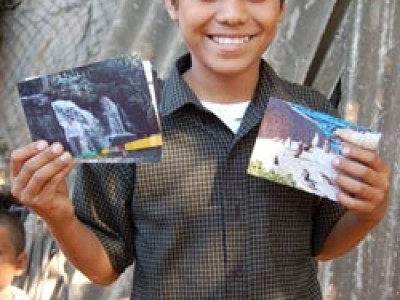
The Impact of Letter Writing
More than four years have passed since Haminton (age 11) wrote, with the teacher’s help, the first letter to his sponsor. His relationship with his sponsor has grown over the years as both of them share their heart and experiences through their letters.
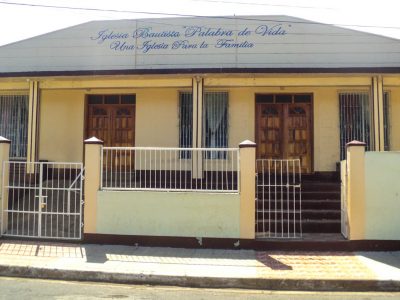
Opening a Child Development Center
The churches we partner with must meet a few requirements to be considered for a child development center. They must be part of an evangelical denomination, have a children’s ministry, have good church facilities to host children and have personnel to teach and care for the children. If they meet this criteria, then the formal application and review process can proceed.
Passion to Serve Poor Children
Sitting under a tent away from the hot sun, talking, smiling and enjoying a plate of rice and chicken is a group of teachers from Fey Esperanza Child Development Center before the beginning of another afternoon with the children.
The teachers are having a good time with each other, but after they finish their lunch, each of them go to their classrooms with excitement to prepare for the afternoon classes.
Seventeen people work at the development center. Most of them have been serving the children since the center started two years ago, and more are being added as more poor children are registered.
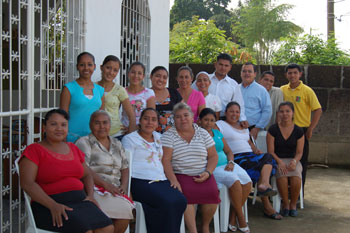
Each of these workers were carefully and prayerfully chosen by the pastor. Before selecting staff, he wrote a list of names to present to the church committee, which considered each one. The committee considers each person’s vision and commitment to working with poor children.
Each worker must have at least one year of high school and a good relationship with God because it is in their hands that the life of the children will rest while working at the development center.
These workers are ideally church members, but if the partner church is too small, then applicants from neighboring churches or from the same denomination can work at the student center. Each person is interviewed by the pastor and committee about their willingness to work at the center.
Child development workers are volunteers who receive an “offering” every month, not a salary. They have limited job opportunities and are at the center because they love God and love to work with poor children. (more…)
A Chance to Survive
Hello Compassion Blog readers.
Sorry I haven’t contributed much lately. I’m still here and still handling crisis communications, in case you were wondering. There is something that has been on my mind that I feel compelled to share with you.
I’m gonna step outside my comfort zone for a minute to share this with you. I have Rheumatoid Arthritis. I was diagnosed with it when I was 15, so I’ve had it for half my life, but you’d probably never know it if you met me. I don’t talk about it much. Most people I interact with on a regular basis don’t even know. In the past 10 years, the medical research and pharmaceutical industries have come a long way in treating the disease, and this has allowed me to live to a virtually pain-free, symptom-free life.
But here’s the thing. I have a normal life simply because I happen to have been born in the United States. I have access to powerful drugs. I have insurance to cover the (outrageously high) cost of them. Certainly I am grateful for this, but lately I’ve been thinking about what my life would be like if I were born into poverty in a developing country. What if I was from rural Rwanda? Or a slum in the Philippines? Or a poor community in Nicaragua?
I’d more than likely be totally crippled by now. At 30 years old.
This thought really freaks me out, to be honest with you. I cannot imagine what it would be like to not be able to stand up straight, to walk, or to grip things. To live in constant, life-altering pain. I feel guilty for being happy I was born here. I don’t have to try to live with this disease without the help of drugs. I am not crippled. I assume it’s similar in a way to the guilt a person feels when they survive a car accident where the other passengers died . . . the ugly injustice of it. I understand that God’s ways are higher than our ways, but I struggle to understand why He chooses for some — why He chose ME — to be born into affluence and why He chooses some to be born into poverty. It’s not fair.
Nowhere is this injustice more evident than in the fight against HIV and AIDS. December 1 was World AIDS Day, and Brianne told you about our AIDS Initiative. The amazing thing about this program is that it literally restores justice to an unjust world. Without access to antiretroviral drugs, those battling AIDS in poverty-stricken countries fight an unwinnable war. By providing the antiretroviral therapy, Compassion allows children with death sentences another chance at life. A chance that, had they been born here, they would have had simply by virtue of their nationality.
If anyone is in the position to get this, it’s Godfrey. He understands that he is alive today because Compassion is fighting the injustice of HIV and AIDS in Uganda. His life is his testimony.
Compassion’s AIDS Initiative is more than just drugs. It’s nutritional support. It’s the critical laboratory testing. It’s psychosocial support. It’s treatment of opportunistic infections. It’s transportation assistance. It’s income generation. It’s housing repair. It’s all the opportunities that a person suffering from HIV here in the U.S. would have.
The AIDS Initiative essentially levels the playing field to give every victim of HIV — no matter where they were born — an equal chance to survive this devastating disease.
Give someone a chance to survive by supporting the AIDS Initiative today.
Poverty’s Shame
“For you, when you help take care of our children, is it easy for you, or is it a sacrifice?”
Something to Get Excited About
Meet Jeffry. He lives in Nicaragua. He is our one millionth registered child.
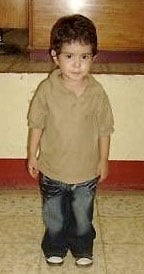 A registered child is different than a sponsored child in that the registered child doesn’t have a sponsor . . . yet. Once the registered child gets a sponsor, that child is a sponsored child. Makes sense, right?
A registered child is different than a sponsored child in that the registered child doesn’t have a sponsor . . . yet. Once the registered child gets a sponsor, that child is a sponsored child. Makes sense, right?
The registered children are the ones whose pictures you see on the sponsor a child page at compassion.com and in the child packets at concerts and other events, such as Compassion Sunday.
The registered children are the children who are waiting to be chosen by a sponsor and who the Unsponsored Children’s Fund assists until that sponsor comes along.
The Unsponsored Children’s Fund bridges the gap between registration and sponsorship. It allows the registered child to have all the same benefits as the sponsored child.
We don’t have one million children waiting for sponsors. Jeffry is the one millionth child concurrently registered. More than 850,000 of those children already have sponsors. And since Compassion began in 1952, nearly two million children have been part of our programs.
That’s a little context for this post that Mark Hanlon, Compassion’s senior vice president of sponsor and donor development, submitted from Nicaragua yesterday.
It was like so many other Compassion child home visits I’d done before (and in my 28 years at Compassion, I’ve done a few!), but this one seemed to hold a bit of extra anticipation and excitement for me.
I happened to be in Nicaragua two weeks after we had registered our millionth child for the very first time. It turns out that this millionth child is a little 3-year-old boy in Nicaragua.
The office staff there was so excited, and they set up a home visit for me to meet little Jeffry.
It was kind of strange because Jeffry had no idea what a historic milestone he is in the history of Compassion.
In fact, when I got there with several of the Compassion Nicaragua staff and some of the center staff, he was totally overwhelmed. Too much attention by too many grown-ups all at once – and he did what many normal little 3-year olds do – he covered up his eyes with his hands (a la “see no evil”) and pretended we weren’t there!
When his grandmother (who is his caregiver since his mother now lives in the U.S. and couldn’t take him with her) tried to get him to take his hands away from his face, he ran away crying.
That was OK. We shifted our focus to the grandmother and asked her questions about the impact of having Jeffry registered in the program at the church.
She talked about the hope and a future she had for Jeffry to get through high-school and maybe even go to university.
She expressed concern over his health and the health of her husband who has diabetes.
She talked about the challenges of supporting a household of 17 adults and children in her dirt floor, cinder block structure in the heart of economically challenged Managua.
Her husband (the diabetic) and her three sons work hard as day laborers – when there is work – and they have terrible difficulty in making ends meet. She wanted better for her little grandson, Jeffry.
Then it struck me that this visit indeed was like most other visits I’d done. Parents (and grandparents) worldwide want the same thing for their children – a better future than what they have.
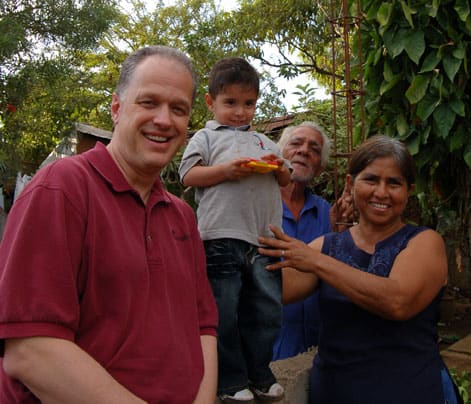
It didn’t matter one bit to Jeffry or his grandmother that he is Compassion’s millionth child. What did matter is that they now have some hope.
And now, I really was excited to be there! Not because I got to meet the millionth child in his home, but because I got to see something that Compassion gets to be a part of with the local church every day. Releasing a motherless child, living in extreme poverty, living with 16 other people, from poverty in Jesus’ name.
Now that’s something to get excited about!

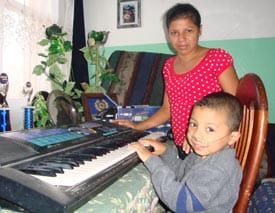 Reluctantly, Stuart’s mom agreed to travel to Guatemala, but later regretted her decision and turned down her permission to let Stuart travel. Her fear was that this surgery leaves a small open hole in the patient’s throat for at least one year, depending on the alimentation and care that he is given.
Reluctantly, Stuart’s mom agreed to travel to Guatemala, but later regretted her decision and turned down her permission to let Stuart travel. Her fear was that this surgery leaves a small open hole in the patient’s throat for at least one year, depending on the alimentation and care that he is given. 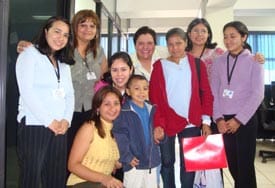 Compassion Guatemala, through its Country Director as well as the local office’s prayer group and many of its staff, constantly monitored Stuart’s case to see how he was doing. Stuart received many gifts from the staff and was even taken to church and then to an outing by one of the staff members on a beautiful Sunday.
Compassion Guatemala, through its Country Director as well as the local office’s prayer group and many of its staff, constantly monitored Stuart’s case to see how he was doing. Stuart received many gifts from the staff and was even taken to church and then to an outing by one of the staff members on a beautiful Sunday. 
